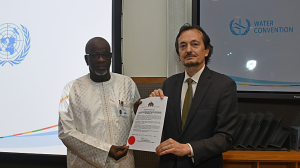
The Gambia has taken a decisive step for cooperative water action by officially becoming the 52nd Party to the Convention on the Protection and Use of Transboundary Watercourses and International Lakes (known as the UN Water Convention) and 9th Party in Africa. The Gambia’s accession comes within weeks of Namibia and Panama’s accessions, demonstrating the growing global momentum for cross-border water cooperation, supported by the Water Convention.
At a ceremony held during the SDG 6 and the Water Action Agenda Special Event of the High Level Political Forum on Sustainable Development in New York on 17 July 2023, The Gambia’s Minister of Fisheries, Water Resources and National Assembly Matters, Hon. Musa Drammeh stated that “The Gambia has forged and pioneered regional water cooperation through the 1978 Convention, establishing the river Gambia Basin Organization (OMVG)”. He recalled that since February 2019, the Water Convention Secretariat with other technical and financial partners have supported the dialogue on the concerted management of the Senegalo-Mauritanian Aquifer Basin (SMAB), leading to the development of a Joint-Regional Project and a Ministerial Declaration in September 2021. “Hence, being part of these two basins, our accession to the two UN Water Conventions, would strengthen our capacity to effectively participate in transboundary water cooperation through the support of the Water Convention to enhance Integrated Water Resources Management at national level”.
Convention Parties welcomed The Gambia as the 9th African nation to join the Convention since 2018 (following Chad, Senegal, Guinea-Bissau, Ghana, Togo, Cameroon, Nigeria and Namibia). In Africa, 90% of surface water is in transboundary basins.
UNECE Executive Secretary Olga Algayerova stated: “Cross-border water cooperation underpins the entire sustainable development agenda, and is crucial for climate change adaptation in shared basins. I welcome the accession of The Gambia to the UN Water Convention, which further consolidates the strong momentum for water cooperation in Africa and worldwide, harnessing this proven multilateral treaty. I encourage all nations sharing water resources to join the Water Convention”.
For the Gambia, membership will make a significant contribution to the more dependable management of its water resources, jointly with its neighbouring states. The Gambia is a downstream country along the Senegal River, which shares all its land borders with Convention Party Senegal. It also shares the river Gambia and the Senegalo-Mauritanian Aquifer, for which the Convention is already supporting cooperation, with Senegal and Guinea Bissau. The river Gambia basin covers over 90% of The Gambia’s land surface while accounting for 13% of the basin area. The Gambia has a water dependency index of 60%, as most of its total renewable water resources flow from other riparian countries, mainly from Senegal and Guinea.
The basins provide substantial irrigation water supply (tidal and pump), are vital for ecosystems, hydropower potential, and industrial needs. They also link the populations, and create socioeconomic interdependencies between the riparian countries. In this light, The Gambia’s accession will further strengthen dialogue to ensure concerted management of its shared waters.
At the High-Level Political Forum, the President of the General Assembly Mr Csaba Kőrösi stressed that "We need inclusive, comprehensive transboundary agreements, on the basis of the UN Water Convention, to support countries in all regions".
The Water Convention, whose secretariat is serviced by UNECE, is a unique and widely accepted intergovernmental legal framework. Open to accession by all UN Member States since 1 March 2016, the Convention now counts 52 parties. It requires Parties to prevent, control and reduce negative impacts on water quality and quantity across borders, to use shared waters in a reasonable and equitable way, and to ensure their sustainable management through cooperation. Parties bordering the same transboundary waters are obliged to cooperate by concluding specific agreements and establishing joint bodies.
Complementing its accession to the Water Convention, the Gambia today also acceded to the Convention on the Law of the Non-navigational Uses of International Watercourses (Watercourses Convention). The United Nations Secretary-General has called on all UN Member States to join both UN Water Conventions.

